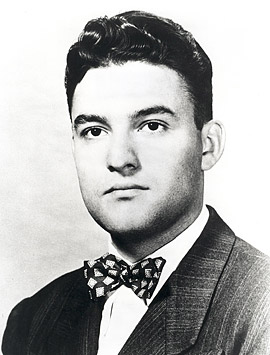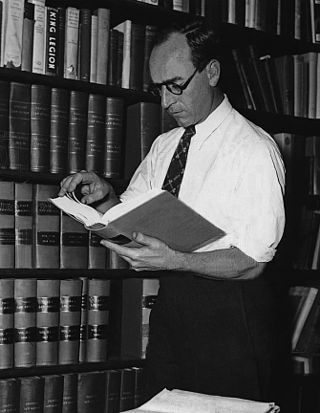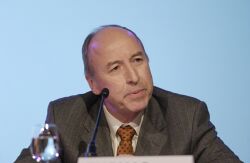Related Research Articles

A law school in the United States is an educational institution where students obtain a professional education in law after first obtaining an undergraduate degree.
Legal realism is a naturalistic approach to law; it is the view that jurisprudence should emulate the methods of natural science, that is, it should rely on empirical evidence. Hypotheses must be tested against observations of the world.

The University of Chicago Law School is the law school of the University of Chicago, a private research university in Chicago, Illinois. It is consistently ranked among the best and most prestigious law schools in the world, and has many distinguished alumni in the judiciary, academia, government, politics and business. It employs more than 180 full-time and part-time faculty and hosts more than 600 students in its Juris Doctor program, while also offering the Master of Laws, Master of Studies in Law and Doctor of Juridical Science degrees in law.

Robert Maynard Hutchins was an American educational philosopher. He was president (1929–1945) and chancellor (1945–1951) of the University of Chicago, and earlier dean of Yale Law School (1927–1929). His first wife was the novelist Maude Hutchins. Although his father and grandfather were both Presbyterian ministers, Hutchins became one of the most influential members of the school of secular perennialism.
Wesley Newcomb Hohfeld was an American jurist. He was the author of the seminal Fundamental Legal Conceptions as Applied in Judicial Reasoning and Other Legal Essays (1919).

Jack Greenberg was an American attorney and legal scholar. He was the Director-Counsel of the NAACP Legal Defense Fund from 1961 to 1984, succeeding Thurgood Marshall. He was involved in numerous crucial cases, including Brown v. Board of Education, which ended segregation in public schools. In all, he argued 40 civil rights cases before the U.S. Supreme Court, and won almost all of them.

Karl Nickerson Llewellyn was an American jurisprudential scholar associated with the school of legal realism. The Journal of Legal Studies has identified Llewellyn as one of the twenty most cited American legal scholars of the 20th century.

Thomas Lee Pangle, is an American political scientist. He holds the Joe R. Long Chair in Democratic Studies in the Department of Government and is Co-Director of the Thomas Jefferson Center for Core Texts and Ideas at the University of Texas at Austin. He has also taught at the University of Toronto and Yale University. He was a student of Leo Strauss.
Kenji Yoshino is a legal scholar and the Chief Justice Earl Warren Professor of Constitutional Law at New York University School of Law. Formerly, he was the Guido Calabresi Professor of Law at Yale Law School. His work involves constitutional law, anti-discrimination law, civil and human rights, as well as law and literature, and Japanese law and society.
Charles Lund Black Jr. was an American scholar of constitutional law, which he taught as professor of law from 1947 to 1999. He is best known for his role in the historic Brown v. Board of Education Supreme Court case, as well as for his Impeachment: A Handbook, which served for many Americans as a trustworthy analysis of the law of impeachment during the Watergate scandal.
A correspondence law school is a school that offers legal education by distance education, either by correspondence or online by use of the internet, or a combination thereof.
A. Leon Green was an American legal realist, a pioneer in Tort law, nationally known writer and scholar, and dean of Northwestern University School of Law for 38 years. Through his efforts, Northwestern had one of the strongest law schools in the United States during the 1930s and the 1940s. He also served as professor at Yale Law School and the University of Texas School of Law. Green wrote the "groundbreaking book, The Rationale of Proximate Cause, in 1927.
Stephen Wizner is the William O. Douglas Clinical Professor of Law at Yale Law School. He also has a Special Appointment as the Sackler Professor of Law at Tel Aviv University.
Arthur Linton Corbin was an American lawyer and legal scholar who was a professor at Yale Law School. He contributed to the development of the philosophy of law known as legal realism and wrote one of the most celebrated legal treatises of the 20th century, Corbin on Contracts.

One L: The Turbulent True Story of a First Year at Harvard Law School is a 1977 autobiographical book by Scott Turow.
Myres Smith McDougal was a scholar of international law and Sterling Professor of International Law at the Yale Law School, where he taught for fifty years. He also taught at New York Law School. He was an influential proponent of a "policy-oriented" approach to international law that became associated with Yale Law School.
Friedrich "Fritz" Kessler was an American law professor who taught at Yale Law School, University of Chicago Law School, and University of California, Berkeley School of Law. He was a contract law scholar, but he also wrote about trade regulation law. He was regarded as a member of the American Legal Realism School.
William Underhill Moore (1879–1949) was an American legal scholar and Sterling Professor of Law at the Yale Law School (1929–49), having previously taught at Columbia. His principal teaching fields were commercial bank credit and business organizations, Moore was considered one of the intellectual leaders of the Legal Realism movement at Yale and an early user of social scientific methods in legal research.
Walton Hale Hamilton was an American law professor who taught at Yale Law School (1928–1948). In 1919, Hamilton coined the term "institutional economics".
Mirjan Damaška is an American and Croatian jurist and legal scholar, known for his works in the sphere of comparative criminal justice and international criminal law. He was a professor at the Faculty of Law in Zagreb, where he was an acting dean in 1970. He is currently a Sterling Professor emeritus at the Yale Law School, where he has taught since 1976.
References
- ↑ Yale Law School, Nascent Realism.
- ↑ Book Review, 40 Harv. L. Rev. 510, 513 (1926).
- ↑ Bruce Catton, Catton's Washington Column, Victoria Advocate (Dec 10, 1939). See also Fred Rodell, Woe Unto You Lawyers (1939).
- ↑ Not all of his colleagues agreed with his approach. Professors Friedrich Kessler and Grant Gilmore at times referred to Sturges's brand of legal realism as legal nihilism. See, e.g., Grant Gilmore, The Ages of American Law 81 (1977).
- ↑ For Wesley Sturges: On the Teaching and Study of Law, 72 Yale L.J. 646, 654 (1963).
- ↑ Bonnie Collier, A Conversation with Ralph S. Brown 5 (2014), Yale Law School Oral History Series. Book 8.